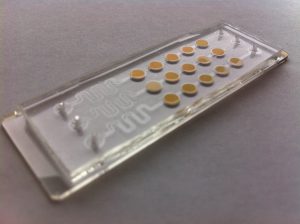
Prostate Cancer (PC) is the second most common cancer and the sixth leading cause of cancer death among men worldwide. The worldwide PC burden is expected to grow to 1.7 million new cases and 499 000 new deaths by 2030. ECpE’s Dr. Long Que and his laboratory have created a chip that may help combat against this prominent illness.
Que’s laboratory recently developed an optofluidic chip-based diagnostic system. This type of chip offers 50-100 fold more sensitivity compared with the traditional ELISA for detecting biomarkers such as prostate-specific antigen (PSA) and neuroendocrine marker (NEM) for prostate cancer (PC).
By testing clinic samples using this type of chip along with the assistance of Que’s collaborator Dr. Girsh Shah, it appears that combined NEM+PSA test can significantly improve reliability of PC detection and significantly reduce the number of diagnostic biopsies.
This type of chip not only can be made disposable thereby avoiding any possible cross-contamination during the test, but also can offer many advantages such as elimination of the labeled antigen, the need of the sophisticated equipment and the highly trained individuals. These advantages make the technology suitable for point-of-care application to screen elderly male populations for PC and to monitor the progress of patients undergoing PC treatment. As early detection is essential for good PC prognosis and treatment options, this chip will assist in proactive PC prevention.
Que’s biomedical technology has been featured in publications such as World Biomedical Frontiers and Uro Today. For more information, visit the feature on Uro Today.